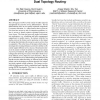Free Online Productivity Tools
i2Speak
i2Symbol
i2OCR
iTex2Img
iWeb2Print
iWeb2Shot
i2Type
iPdf2Split
iPdf2Merge
i2Bopomofo
i2Arabic
i2Style
i2Image
i2PDF
iLatex2Rtf
Sci2ools
111
click to vote
CONEXT
2007
ACM
2007
ACM
Improving service differentiation in IP networks through dual topology routing
The convergence on IP of a wide variety of traffic types has strengthened the need for service differentiation. Service differentiation relies on two equally important components: (i) resource allocation, i.e., what resources does a given service class have access to; and (ii) contention resolution, i.e., how is access to shared resources arbitrated between services classes. The latter has been well studied with numerous mechanisms, e.g., scheduling and buffer management, supporting it in modern routers. In contrast, relatively few studies exist on the former, and in particular on the impact of routing that determines the resources a given service class is assigned to. This is the focus of the paper, which seeks to investigate how routing influences a network's ability to efficiently support different service classes. Of particular interest is the extent to which the ability to route service classes separately is beneficial. This question is explored for a base configuration invo...
Related Content
| Added | 14 Aug 2010 |
| Updated | 14 Aug 2010 |
| Type | Conference |
| Year | 2007 |
| Where | CONEXT |
| Authors | Kin Wah Kwong, Roch Guérin, Anees Shaikh, Shu Tao |
Comments (0)

